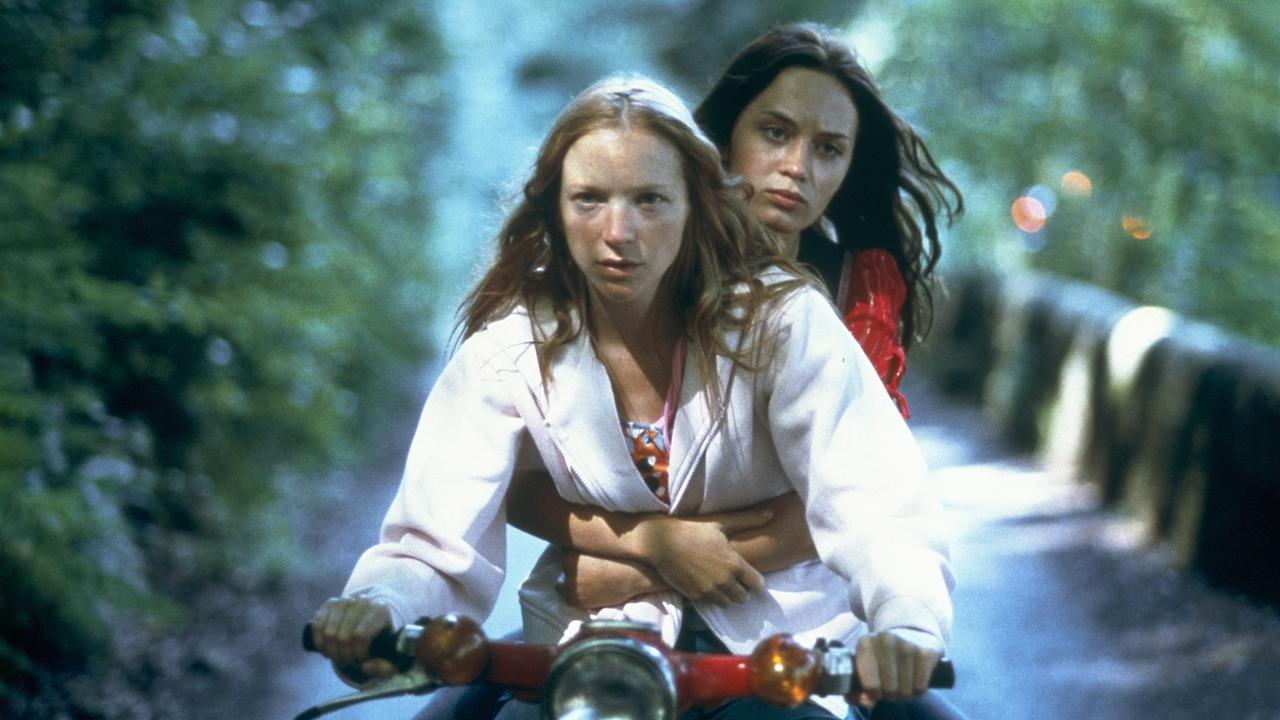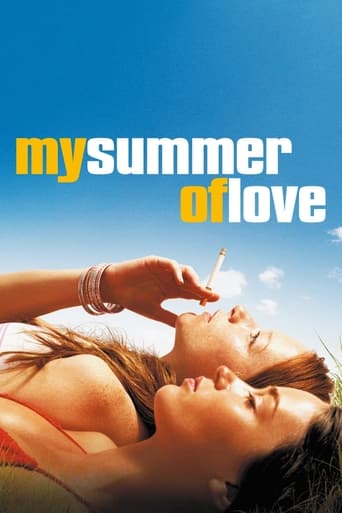Diagonaldi
Very well executed
Teringer
An Exercise In Nonsense
Ogosmith
Each character in this movie — down to the smallest one — is an individual rather than a type, prone to spontaneous changes of mood and sometimes amusing outbursts of pettiness or ill humor.
Robert Joyner
The plot isn't so bad, but the pace of storytelling is too slow which makes people bored. Certain moments are so obvious and unnecessary for the main plot. I would've fast-forwarded those moments if it was an online streaming. The ending looks like implying a sequel, not sure if this movie will get one
Thomas Drufke
You get what you expect with this film. You get love, and you get summer fun. The story is about two girls trying to escape their troubled family life and explore things together. Emily Blunt is always good, and I was pleased with Natalie Press' performance as well. Besides the fact this is a lesbian based relationship, you actually get a true romance to go along with it. I understand for some people, the idea of this love is offsetting but the film depicts it more as summer fun then a dissection of lesbian lovers.I have to say it's pretty predictable, and there isn't as much depth to it as I would have thought. But considering this is basically Emily Blunt's first starring role, I think it's worth the watch. Mona and Tamsin did play well off each other, much props to both the actresses for going beyond what a typical actor would do. I'm sure it takes guts to do this type of role, especially early on in their careers. The film isn't anything special, but it does give you 85 minutes of summer. And to me, it's always good to step away from life for a few hours and enjoy a different lifestyle than your own. I really like the movies that send you to a different part of the world and give you more insight into what life is like other places. I wasn't thrilled with the plot overall and the ending could have been handled better.But because of the great lead performances, and the nice feel of summer the film gives you, I think it is a worthy watch. Especially for film buffs, and big fans of Emily Blunt.+Emily Blunt shines +Summer fun -Not enough depth to the story 7.2/10
tieman64
"They work it, we run it, they shouldn't fuss, the order of things is basically just." - Raymond Riley Directed by Pawel Pawlikowski, and based on a novel by Helen Cross, "My Summer of Love" charts the growing romance between Tamsin (Emily Blunt), an upper class college student, and Mona (Nathalie Press), a rural, lower class Scottish girl.At first glance, "My Summer of Love" seems like a straightforward girl meets girl, lesbian love affair. Tamsin and Mona seem like kindred spirits, both alienated young women who suffer hardships. Tamin's father is adulterous and her sister has died, and Mona is repeatedly bullied by various men in her West Yorkshire village, including her born-again Christian brother. Towards its final act, however, it is revealed that Tamsin has been using and misleading Mona for her own personal amusement. Tamsin sees Mona as a plaything. A puppet.If "My Summer of Love's" first half flirts with the idea of upper and lower class girls transcending class divides, its second half does the opposite. For Pawlikowski, idyllic relationships between the oppressed and oppressor are but a fiction. The subordinate will remain subordinate, and any "love" amounts to duplicity and manipulation.Political subtext thus hides behind romantic text. A poor girl bullied by patriarchal, religious and class based institutions, Mona finds herself pushed around by rural men and pesky rich folk who live in aristocratic summer castles. To make matters worse, Tamsin demands a return of all the gifts she once gave Mona. In an instant, Mona's summer idyll comes crashing down. Her summer has been a cheap illusion, an illusion which swiftly gives way to "enlightenment". Now viewing herself through the prism of the class system, the very prism through which others view her, Mona grabs Tamsin by the neck and, in a moment of political consciousness, attempts to drown the girl. Mona stops short of murder. Her brother is also an ex convict. 7.9/10 - Worth one viewing.
CountZero313
Shades of Heavenly Creatures in this unsettling drama from Poland's Pawel Pawlikowski. Working-class Mona, on a broken-down scooter, encounters upper-class Tamsin staring down at her from a horse. The mad, staring eye of the horse should fill Mona with foreboding; instead, she embarks on a summer of love with Tamsin that shimmers with magnetic attraction. Danger, however, feels never far away.Natalie Press as Mona reprises her outing in Wasp, a thrill-seeking member of the underclass, moving inexorably among fags, beer and back-seat sex in lay-byes. Given the chance to blossom, we see there is self-awareness and irony there, too. She also does a very creepy impersonation of someone possessed by the devil. She will discover, however, that possession by evil spirits is no laughing matter.Emily Blunt as Tasmin oozes decadence. Her tears and gnashing at a supposed infidelity by her father does not quite add up. Her fraud expands with some outrageous tales about Edith Piaf, and we feel she is testing the boundaries of Mona's gullibility. But Mona remains hooked. A shape-shifting seductress, there is a self-destructive element to Tasmin's machinations. She comes very close when exposing the religious fraud of Mona's brother Phil (a haunted Paddy Considine), who plummets from the high of raising his cross above their valley, to the low of succumbing to the temptations of the flesh.Set in an unknown valley in an undefined era, the film has an allegorical, other-worldliness to it. No TV, no radio, no mobile phones, no computers. Mona even rides an engine-less bike. Is this purgatory? The true state of the world is revealed to Mona only once she has decided to flee it, and that decision is cast in a new light.Production values never get above made-for-TV level, but My Summer of Love is both poetic and depraved, with characters you may just fall for.
johnnyboyz
My Summer of Love is a wonderfully observed, simmering drama about love, identity and coming-of-age shared between two girls during one warm summer in a sleepy and somewhat unspectacular rural area of England. But where the tall, lonely country houses sit amongst the overkill of trees and tall plantation hidden away, remarkable items happen to two young souls running on scarred prior histories amidst the sunny haze, culminating in a rather terrifying sequence capturing the destructive nature of an extreme fondness for another human being in a location previously established to be a safe haven for admitting said fondness. The film clocks in at under an hour and a half, but achieves so much more and gives you that sense of journey in this short runtime than certain other films clocking in at a round two hours can seemingly do.The girls of the film are Mona (Press) and Tamsin (Blunt), two individuals that meet in a field when the latter, by way of horseback, rides along and finds Mona lying in the grass. Very quickly, the film establishes a sense of empowerment in the character of Tamsin; her position on a horse as we look up from Mona's point of view is distinctive in its use of low angle and positioning of one character quite literally on the floor with the other atop an animal. Mona is bored and lonely, living with recently released but now converted Christian criminal Phil (Considine), her brother, in a disused public house they own; whereas Tamsin is away on suspension from her boarding school for whatever reason. Her place of dwelling being a large and somewhat dystopian place for Mona when she first visits; captured by way of a long shot of the entrance hallway from the inside as she stumbles through the panel floored room full of riches and items.The girls are both of different classes and backgrounds. Lisa is a somewhat rough, pub dwelling loose cannon whose male partner makes crude love to her in the back of his car as during the days, she drifts aimlessly around and mocks her brother's attempts to live a life so much differently to that of his previous one. But these young women are bound by their being stuck in said location and in their inability to connect with parental family figures; plus, a supposed initial sense of unity through past suffering of a death within the family. What follows is a predominant uncovering of sexuality, although certain characters have certain secrets that become more omnipresent in what is a wonderful character piece with the greatest of respects to its subject matter.The film is a mature character study, focusing on the transitions people go through at various stages of their life for whatever reason, with religious transitions and changes linked to one's sexuality taking centre stage. But these transitions are not easy, and what differentiates them from one another is that Phil's is an enforced change, something he consciously takes on with his sister Mona's gradual veering into homosexuality sincerely natural. Polish born director Pawel Pawlikowski shoots the film's location with a warm and misleadingly welcoming glare, complimenting the sorts of emotions I think Mona goes through when she first meets Tamsin and eventually comes to recognise the friendship between them. His long shots of the overall village and its surrounding hills and train lines make it look a bit like a model, as if it isn't really real, which systematically sets up that sense of falseness within some of the characters in the film; that sense of all is not as real as initially established. Later on, whilst in a more suburban part of the town and a housing estate, Tamsin will remark to Mona how fake she thinks everything looks: "like Lego" she exclaims, as the bricked up and much-akin to one another houses stand tall and bland, the sorts of cars in the driveway that Marv from 2005's Sin City would describe as looking like "electric shavers".As their friendship and trust deepens, further visits to Tamsin's large house unfolds for Mona; each one shot as less awe-striking than the first as she gradually settles her way into this relationship with a girl outside of her own class divide. Pawlikowski's script has them dance to an Edith Piaf song together, striking up some rather typical but deliberately so links to French music; the French and that odd sense of romance some people have when thinking of such items. When a kiss ensures at a local secluded spring amidst the sunny glare, Mona tries on a number of different dresses once again back at the house until she can find the right one, a metaphorical sequence capturing her attempts in finding a 'new' her, as her changing persona becomes more apparent.My Summer of Love captures the sense of undergoing transition wonderfully, an identifying of an old way of life or belief then the systematic moving on and away from it. In Phil, that once criminal life that he wishes to bury with a newfound sense of Christianity, as groups of religious people congregate in rooms once lent to drinking one's self into a stupor; is counter-produced with Mona's rejection of her old lifestyle: lazy days doing nothing and evenings of easy, empty sex swapped for a newer and fresher relationship with someone whom will eventually inform her of the kind of love, or loving exchange, that'll instead mean something. Despite disliking brother Phil, and the film making it known she has very few things in common with him, what happens to them both towards the end as they go in search of that epiphany connects them in a way previously unseen as new ways of life and living take their toll. Stark, tragic and smart; My Summer of Love is thoroughly engaging.

